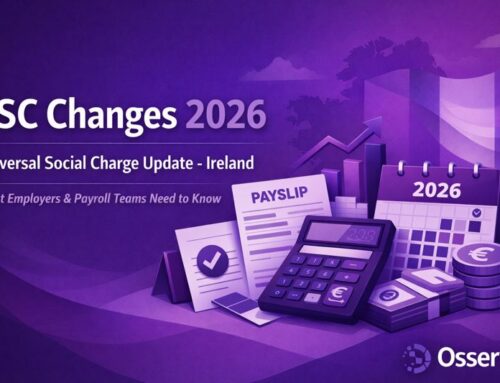Introduced in 2011 during a period of financial reform, the Universal Social Charge (USC) has become a key component of Ireland’s tax system. Though often misunderstood, USC affects most employees and self-employed individuals across the country. For employers, especially those managing payroll, understanding USC is essential for accurate wage calculations and compliance with Revenue.
In this guide, Osservi breaks down what USC is, who pays it, the current rates, and how it’s calculated through payroll.
What Is the Universal Social Charge (USC)?
The Universal Social Charge is a tax deducted from gross income. It replaced the income levy and health levy and applies to all income over a certain threshold.
USC is not the same as PAYE (Pay As You Earn) tax. It is a separate tax with its own thresholds, rates, and exemptions.
It is charged on gross income, including:
- Wages and salaries
- Self-employment income
- Rental income
- Occupational pensions
Who Pays USC in Ireland?
Most individuals earning more than €13,000 annually are liable to pay USC. This includes:
- Employees (deducted via payroll)
- Self-employed individuals
- Pensioners with private pensions above the threshold
- Company directors
Exemptions from USC
You do not pay USC if:
- Your total annual income is €13,000 or less
- You are aged 70 or over or hold a full medical card, and your income is below €60,000
USC Rates for 2025 (Based on Budget 2025)
Below are the current USC rates for 2025. These apply on a cumulative basis—meaning you pay a higher rate only on the portion of income that falls into that band:
| Income Band | Rate |
| First €12,012 | 0.5% |
| Next €11,908 (€12,013–€23,920) | 2% |
| Next €46,380 (€23,921–€70,300) | 4.5% |
| Balance over €70,300 | 8% |
Note: Self-employed individuals earning over €100,000 pay a 3% surcharge, making their top rate 11% on that portion of income.
How USC Is Calculated in Payroll
USC is calculated on a per pay period basis, using cumulative tax credits and thresholds from Revenue. For example:
- Weekly-paid employees are assessed on weekly thresholds.
- Monthly-paid employees are assessed on monthly thresholds.
Your payroll software or payroll provider (like Osservi) automatically:
- Calculates USC deductions
- Applies appropriate bands
- Adjusts for overpayments or underpayments throughout the year
USC and Payroll Compliance for Employers
Employers are legally responsible for:
- Registering employees with Revenue
- Withholding USC based on real-time Revenue instructions
- Submitting payroll information through the Revenue Payroll Notification (RPN)
- Reporting USC deductions through PAYE Modernisation (RTS) every pay cycle
Failure to comply can result in:
- Penalties and interest
- Revenue audits
- Reputational damage
That’s why it’s critical to use Revenue-compliant payroll systems or outsource to a qualified payroll provider like Osservi.
Common Payroll Issues Related to USC
1. Incorrect USC Cut-Off Points
If employee tax credits or cut-off bands are outdated, USC will be over- or under-withheld. Regular updates from Revenue prevent this.
2. Not Applying Medical Card or Age Exemptions
Employers must apply lower rates or exemptions correctly when notified via RPN.
3. Mistakes in USC for Multiple Employments
Employees with two or more jobs may reach higher USC thresholds faster. Coordination between Revenue and employers is key.
Osservi’s payroll experts resolve these challenges efficiently through automated compliance and manual oversight.
How USC Impacts Net Pay
Unlike standard PAYE, USC applies regardless of tax credits, which means even low earners can feel the effect. For instance:
- Someone earning €30,000 a year pays around €720 in USC annually
- USC significantly affects take-home pay, especially when crossing into higher bands
Using payroll software or services that provide transparent payslips helps employees understand their deductions clearly.
How Osservi Supports Clients with USC Compliance
Osservi’s payroll services ensure:
✅ Accurate USC calculations
✅ Automatic Revenue integration
✅ Timely compliance with PAYE
Our experts stay on top of ever-changing tax regulations so you don’t have to.
Final Thoughts
The Universal Social Charge is a critical component of Ireland’s tax system. While it may seem straightforward, the layered rates and frequent updates make it a common source of error for businesses. Employers have a legal duty to apply USC correctly, while employees benefit from understanding how it impacts their net pay.
Need help managing USC or payroll in Ireland? Contact Osservi today for expert, compliant payroll support.
Continue Reading
Get a personal consultation.
Call us today at (01) 5170179
Packages to suit your budget (we are on avg 30% better value than competitors)..
Frequent Searches Leading To Pages:
Payroll Services Ireland | Payroll Services | Payroll Ireland | Payroll Outsourcing Ireland | Outsourced Irish Payroll | Outsource Payroll Services Ireland | Outsourced Irish Payroll Services Dublin & Ireland | Ireland Payroll Service | Payroll companies Ireland | Payroll service provider





